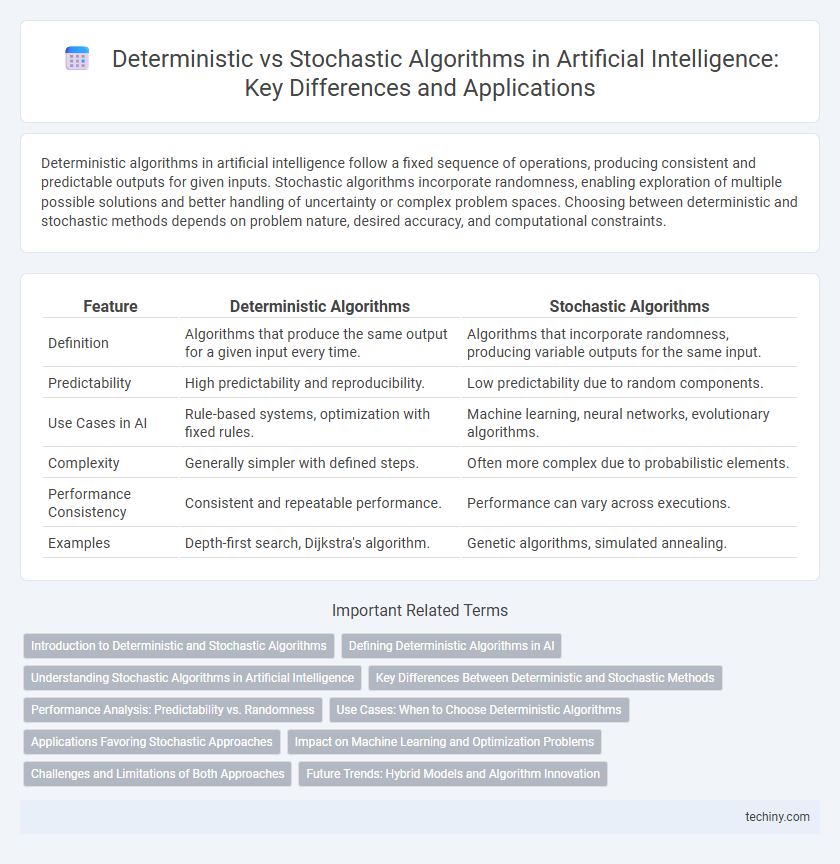Deterministic algorithms in artificial intelligence follow a fixed sequence of operations, producing consistent and predictable outputs for given inputs. Stochastic algorithms incorporate randomness, enabling exploration of multiple possible solutions and better handling of uncertainty or complex problem spaces. Choosing between deterministic and stochastic methods depends on problem nature, desired accuracy, and computational constraints.
Table of Comparison
| Feature | Deterministic Algorithms | Stochastic Algorithms |
|---|---|---|
| Definition | Algorithms that produce the same output for a given input every time. | Algorithms that incorporate randomness, producing variable outputs for the same input. |
| Predictability | High predictability and reproducibility. | Low predictability due to random components. |
| Use Cases in AI | Rule-based systems, optimization with fixed rules. | Machine learning, neural networks, evolutionary algorithms. |
| Complexity | Generally simpler with defined steps. | Often more complex due to probabilistic elements. |
| Performance Consistency | Consistent and repeatable performance. | Performance can vary across executions. |
| Examples | Depth-first search, Dijkstra's algorithm. | Genetic algorithms, simulated annealing. |
Introduction to Deterministic and Stochastic Algorithms
Deterministic algorithms operate with predictable outcomes, producing the same result for a given input every time, making them ideal for tasks requiring consistency and repeatability. Stochastic algorithms incorporate randomness, allowing exploration of multiple solutions and better performance in complex, uncertain environments such as optimization and machine learning. Understanding the fundamental differences between these algorithm types informs their appropriate application in artificial intelligence development.
Defining Deterministic Algorithms in AI
Deterministic algorithms in artificial intelligence are computational processes that produce the same output for a given input every time they are executed, ensuring predictability and reproducibility. These algorithms follow a fixed sequence of operations without randomness, making them ideal for tasks requiring consistent and reliable results. Examples include rule-based systems and classical search algorithms like A*.
Understanding Stochastic Algorithms in Artificial Intelligence
Stochastic algorithms in artificial intelligence use randomness to explore complex solution spaces, enabling systems to escape local optima and improve learning outcomes. These algorithms, such as genetic algorithms and simulated annealing, provide robustness in uncertain environments by probabilistically guiding the search process. Their adaptability makes them essential for tasks involving optimization, machine learning, and probabilistic inference where deterministic methods often fall short.
Key Differences Between Deterministic and Stochastic Methods
Deterministic algorithms produce consistent and predictable outputs for a given input, utilizing fixed rules and logic, making them reliable for tasks requiring precise replication. Stochastic algorithms incorporate randomness or probabilistic elements, enabling exploration of diverse outcomes and better handling of uncertainty in complex problem-solving scenarios. The key difference lies in determinism versus randomness, influencing performance, convergence, and adaptability in AI applications such as optimization, machine learning, and decision-making processes.
Performance Analysis: Predictability vs. Randomness
Deterministic algorithms guarantee consistent output and predictable performance by following fixed computational steps, making them ideal for applications requiring reliability and reproducibility. Stochastic algorithms incorporate randomness, enhancing performance in complex problem-solving and optimization tasks where exploration of diverse solutions improves the likelihood of reaching global optima. Performance analysis reveals deterministic methods excel in precision and stability, while stochastic approaches offer superior adaptability and robustness in uncertain or dynamic environments.
Use Cases: When to Choose Deterministic Algorithms
Deterministic algorithms are ideal for use cases requiring guaranteed outcomes and reproducibility, such as cryptographic protocols, sorting tasks, and real-time systems where predictability is critical. In applications like automated control systems and formal verification, deterministic models ensure consistent performance and facilitate debugging and auditing. These algorithms are preferred when the problem domain demands exact calculations and no tolerance for randomness or variability in results.
Applications Favoring Stochastic Approaches
Stochastic algorithms excel in applications requiring optimization under uncertainty, such as machine learning, natural language processing, and complex system simulations, where random sampling helps navigate large, high-dimensional search spaces effectively. These algorithms, including genetic algorithms and Markov Chain Monte Carlo methods, adapt better to noisy data and probabilistic models compared to deterministic counterparts. Their ability to escape local optima and approximate global solutions makes them ideal for real-world problems in AI involving incomplete or uncertain information.
Impact on Machine Learning and Optimization Problems
Deterministic algorithms provide consistent outputs for identical inputs, ensuring reproducibility and reliability in machine learning model training and optimization tasks. Stochastic algorithms incorporate randomness, enabling exploration of complex, high-dimensional solution spaces and often avoiding local optima, which enhances performance on non-convex optimization problems. The interplay between deterministic precision and stochastic flexibility critically influences the efficiency and accuracy of AI systems in diverse applications such as neural network training and evolutionary computation.
Challenges and Limitations of Both Approaches
Deterministic algorithms face challenges related to rigidity and lack of adaptability in uncertain or dynamic environments, limiting their effectiveness in complex AI tasks. Stochastic algorithms, while better at handling uncertainty through probabilistic decision-making, struggle with issues of convergence, reproducibility, and computational inefficiency. Both approaches encounter limitations in balancing accuracy, scalability, and interpretability when applied to real-world AI problems.
Future Trends: Hybrid Models and Algorithm Innovation
Future trends in artificial intelligence emphasize hybrid models that combine deterministic algorithms' precision with stochastic algorithms' adaptability to enhance decision-making and predictive accuracy. Innovations in algorithm design focus on leveraging machine learning techniques to optimize performance in dynamic environments, enabling real-time adjustments and improved robustness. These advancements pave the way for AI systems capable of handling complex, uncertain data while maintaining computational efficiency and reliability.
Deterministic Algorithms vs Stochastic Algorithms Infographic

 techiny.com
techiny.com